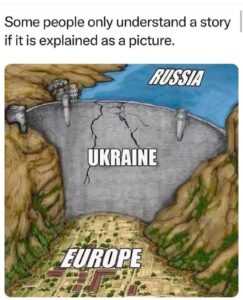Europe at a Crossroads: Understanding the Implications of Conflict with Ukraine

In a tense and evolving landscape, the rhetoric from influential European leaders is reaching new heights, with the President of the European Parliament, Roberta Metsola, asserting Ukraine’s role as the defender of Europe against the aggression of Russia. This phrasing suggests that Ukraine is not simply fighting for its own sovereignty but is positioned as the bulwark of European security itself. However, this narrative raises crucial questions about the broader implications of European engagement in the conflict.
The underlying dynamics are complex. Metsola’s assertion comes at a time when political leaders are grappling with the rise of aggressive nationalism and the specter of war—sentiments reminiscent of past global conflicts. While supporters argue that Ukraine’s struggle is fundamentally tied to European values and unity, critics point to the destabilizing consequences of such a stance.
The Neoconservative Influence
An important aspect worth discussing is the growing influence of neoconservative ideologies among European leadership. Many policymakers appear to align themselves with a hawkish stance, fueled by entities such as the Institute for the Study of War. This organization often promotes a narrative that frames Russia as both weak and nefarious, pushing for a continuation of military engagement rather than diplomatic resolutions.
One cannot ignore that historical patterns suggest that extensive military involvement often leads to unintended consequences, including economic burdens that future generations will have to shoulder. The current geopolitical climate in Europe may similarly push nations towards a reckless chase for dominance, potentially mirroring the cycles of conflict seen in the past.
The Risk of Escalation and Conscription
One of the most pressing concerns is the possibility of an escalation of conflict that could draw Europe directly into the fray. With leaders in places like Poland calling for military readiness, the specter of conscription looms ever larger. How many more young lives must be put at risk in a conflict that often feels more about historical grievances than tangible benefits for ordinary citizens?
The fallout of such strategies could be profound—not merely in terms of human cost but also through the potential financial repercussions that might bring nations to their knees. We know from history that the specter of war leads to policies like capital controls, where economies become heavily regulated in times of unrest, further straining the social fabric of nations.
Europe’s Future: A Path of Diplomacy
At Extreme Investor Network, we believe that the primary responsibility of any government should be to AVOID war. Negotiation and dialogue must take precedence over escalating tensions. In the past, leaders like Ronald Reagan faced immense pressure from hardliners who warned against engaging with the Soviet Union. His willingness to seek peace remains a lesson for today’s leaders.
What Europe could learn from this is that the pathway to stability does not lie in aligning with militaristic narratives but rather in building robust diplomatic ties—even with adversaries. By persistent dialogue, Europe can avoid becoming a battleground for conflicting ideologies.
Conclusion: The Choice is Ours
As Europe stands on the brink of a potential military conflict, the choices made in the coming months will imprint on history. Will European leaders prioritize peace over provocation? The alternative could be catastrophic—leading to not only the destruction of a generation through conscription but also the possibility of a broader conflict that engulfs the continent.
We urge our readers—both European and global—to be mindful of the consequences of narrative management and the ever-present risk of war. The sounds of diplomacy must rise above the crude drums of war if Europe is to redefine its path toward stability and prosperity.
Stay informed and engaged; the challenges we face today will shape the future for generations to come. Sign up with Extreme Investor Network for on-the-ground analysis and unique insights into the geopolitical landscape that impact not only our investments but the global economy at large.

